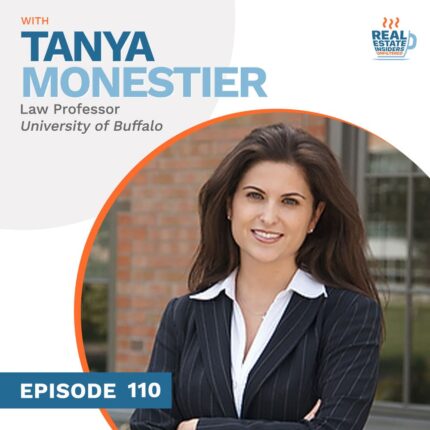Hosts James Dwiggins and Keith Robinson sit down with Tanya Monestier, a law professor at the University of Buffalo, to unpack the controversial NAR settlement. Together, they explore its flaws, legal loopholes, and the massive payouts to attorneys, shedding light on how these issues impact real estate professionals and consumers.
With Tanya’s expert insights and the hosts’ candid commentary, this episode dives deep into the evolving legal landscape of the real estate industry and what it means for the future.
The Settlement: A Win for Whom?
The podcast kicks off with a lively discussion about the NAR settlement, which has drawn mixed reactions across the real estate industry. On the surface, the settlement appears to address issues of real estate financing, real estate prices, and consumer rights, but Tanya highlights several flaws that could undermine its effectiveness.
One of the most significant issues she points out is how the settlement benefits lawyers more than consumers. According to Tanya, while consumers may receive as little as $20 each, lawyers are walking away with eye-popping payouts—something that feels fundamentally unfair in a class-action lawsuit.
Key Issues with the Settlement Forms
Tanya’s expertise in contract law shines through as she critiques the settlement forms used in real estate brokerages. Here are some of the issues she raised:
- Complexity and Lack of Clarity: Forms are written in dense legalese that even experienced lawyers struggle to interpret. This creates a disconnect for consumers making the biggest financial decisions of their lives, such as purchasing real estate for sale.
- Workarounds and Loopholes: Some forms allow for practices like retroactive commission adjustments, which violate the spirit of the settlement. This creates confusion for both consumers and real estate agents.
- Consumer-Unfriendly Practices: Tanya argues that the forms fail to prioritize the consumer experience, making it harder for buyers and sellers to understand their rights and obligations.
If you’re a real estate broker or work with real estate listings, these forms could become a significant hurdle. Simplifying the paperwork and aligning with the settlement’s intent could go a long way in building trust with clients.
Touring Agreements and Their Limitations
One contentious point discussed in the episode is the use of touring agreements. Tanya explains that while these agreements are designed to facilitate property tours, they often leave room for unethical practices. For example:
- Agents offering “free” touring agreements for a limited time cannot later retroactively claim compensation for those tours.
- Buyers must be cautious about what they sign, as the agreements often include fine print that could catch them off guard.
If you’re navigating the current real estate market, it’s essential to understand the limitations of these agreements to avoid potential legal headaches.
Tanya’s Bold Appeal for Change
One of the most inspiring aspects of this episode is Tanya’s willingness to challenge the system. She’s filed an objection to the settlement, citing issues such as:
- Disproportionate attorney fees: While the legal team stands to gain over $300 million, the consumers see little benefit.
- Lack of accountability: Tanya points out that real estate companies near me and associations need to do more to ensure compliance with the settlement terms.
Her actions remind us of the importance of advocacy and transparency in the real estate industry. Whether you’re part of a real estate franchise like NextHome or an independent agent, these legal battles have far-reaching implications for everyone.
Takeaways for Real Estate Professionals
So, what does this all mean for you as a real estate agent or real estate broker? Here are a few actionable insights:
- Prioritize Transparency: Simplify your forms and contracts to build trust with clients. Make sure your documentation aligns with legal requirements and is easy for consumers to understand.
- Stay Informed: Tune in to real estate podcasts like Real Estate Insiders Unfiltered to keep up with industry trends, legal updates, and best practices.
- Advocate for Change: As a professional in the real estate market, you have a role in shaping the future of the industry. Whether it’s through attending real estate events, taking real estate courses, or engaging in discussions, your voice matters.
- Leverage Technology: Tools like real estate blogs, real estate books, and real estate technology can help streamline your processes and enhance your client’s experience.
If you’re ready to stay ahead in the ever-evolving world of real estate investing, real estate trends, and real estate financing, be sure to subscribe to the podcast. Let’s keep the conversation going and work together to create a better experience for everyone in the real estate industry.
Catch the full episode now and share your thoughts in the comments!








